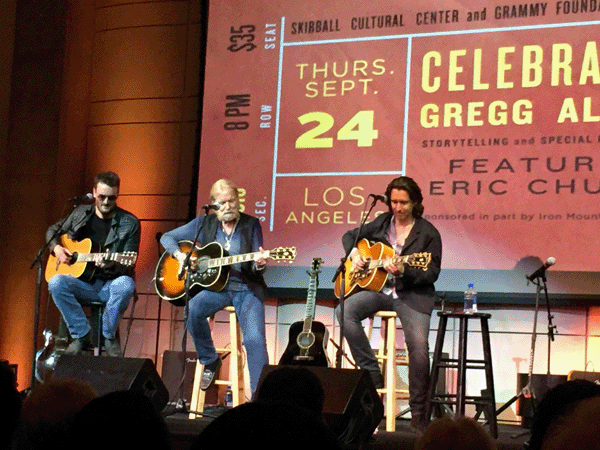
The currently ongoing Bill Graham exhibit at the Skirball Center in Los Angeles is an impressive and considerate display dedicated to the life of the late concert promoter, but also serves as an up-close, behind the glass look at rock and roll’s splendorous past. Last night, in conjunction with the exhibition, the Grammy Foundation’s Living Histories program brought bygone and present together, as rock legend and longtime friend of Graham’s, Gregg Allman, appeared at the Skirball for Celebrating Gregg Allman: Storytelling and Special Performances, featuring Eric Church. Combining a sit-down interview with Scott Goldman, Vice President of the Grammy Foundation and MusiCares, with a brief acoustic performance, Allman talked mostly of the early years on the road before treating the lucky gathered to several classic songs.
The night was Allman’s but not without conspicuous nods to Graham, such as baskets of apples on every table of a pre-show reception (a reference to Graham’s complimentary offer of the fruit to Fillmore patrons), as well as a short commemorative video opening the proceedings. Goldman introduced Allman with video clips, as well, including the golden-haired singer in concert with The Allman Brothers Band, before the man, himself took the stage to a standing ovation from the sold-out Cotson Auditorium audience. Asked early in the conversation if playing Graham’s Fillmore for the first time meant he’d ‘made it’ in the music business, Allman remarked to laughter and applause, “This ‘made-it’ thing is overrated. Some days you make it, and some days you don’t.”
Dressed in jeans, a grey long-sleeved T-shirt, and unbuttoned black vest, the veteran musician appeared relaxed and in good spirits, often allowing tales to stretch beyond a basic answer into entertaining soliloquies. He recalled buying an antique gun as a gift for Graham, (and for himself, bottles of original Coca-Cola from the 1920s, subsequently lost in divorce), and quoted Rolling Stones guitarist Keith Richards in describing the promoter as the sultan of rock and roll. When Goldman posed the question as to the Allman Brothers Band’s best period, Allman said the first incarnation with his late brother Duane was superior.
At the midway point, Goldman welcomed country star Church, also to a standing ovation, to the discussion. “I stole as much of it as I could steal,” Church confessed when asked of The Allman Brothers Band’s influence on his own musical development. He called “Win, Lose Or Draw,” the best country song ever before offering a solo rendition of the 1975 title track from the Allman Brothers Band’s sixth album, following that with his own “A Man Who Was Gonna Die Young.” The pair then shared thoughts on the value of truth in songwriting and performance, with Church commenting, “Anytime I heard anything Gregg had written, I believed it.”
Church stepped off-stage while Allman and his guitarist Scott Sharrard played a beautifully riveting “Melissa,” and after a story of his old Hollywood roommate Jackson Browne, a reflective take on Browne’s “These Days”. Rejoining the two, Church shared vocals on Allman’s anthem to the endless highway “Midnight Rider,” showcasing exquisite three-part harmony against Sharrard’s tantalizing bottleneck slide to a final standing ovation. Closing the two-hour festivities, Goldman presented Allman with an award in recognition of his contributions to the Living Histories series, before a wave good-bye, into an awaiting elevator, and back on the road.


No Comments comments associated with this post